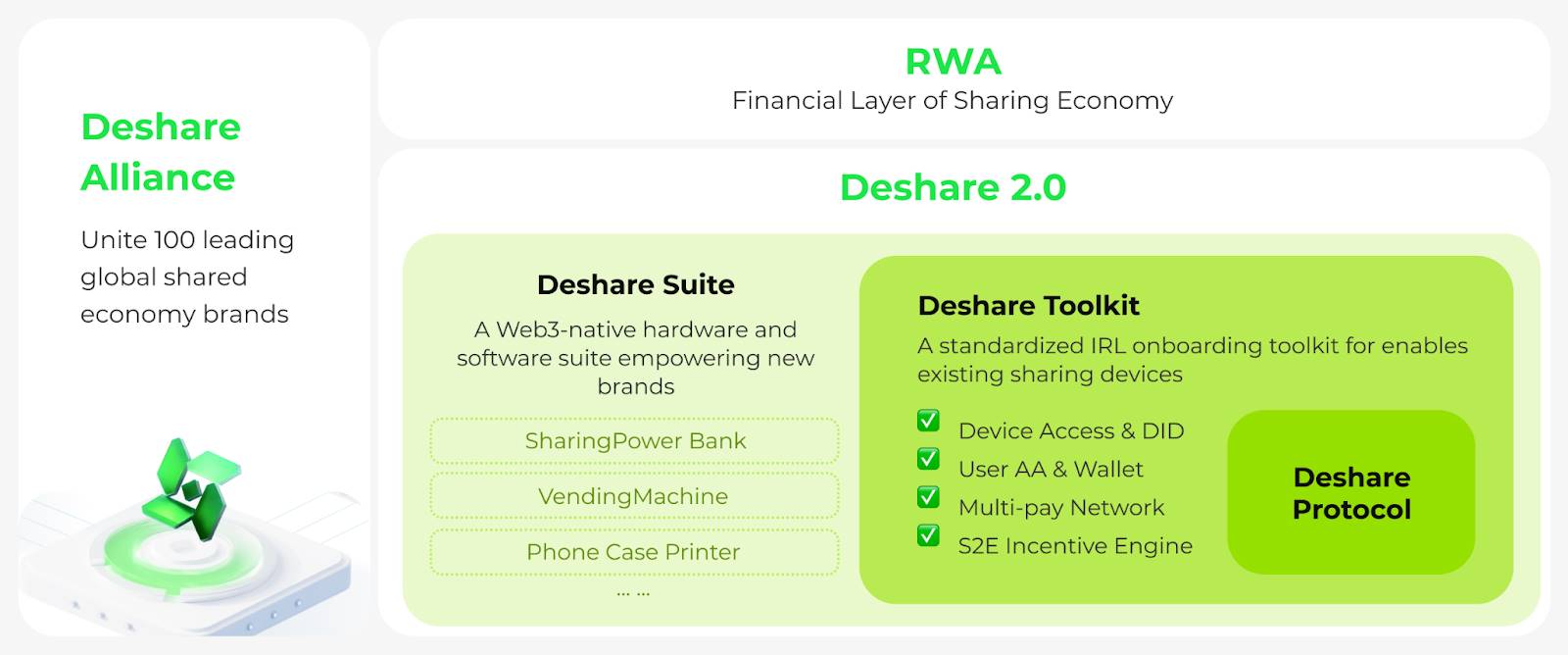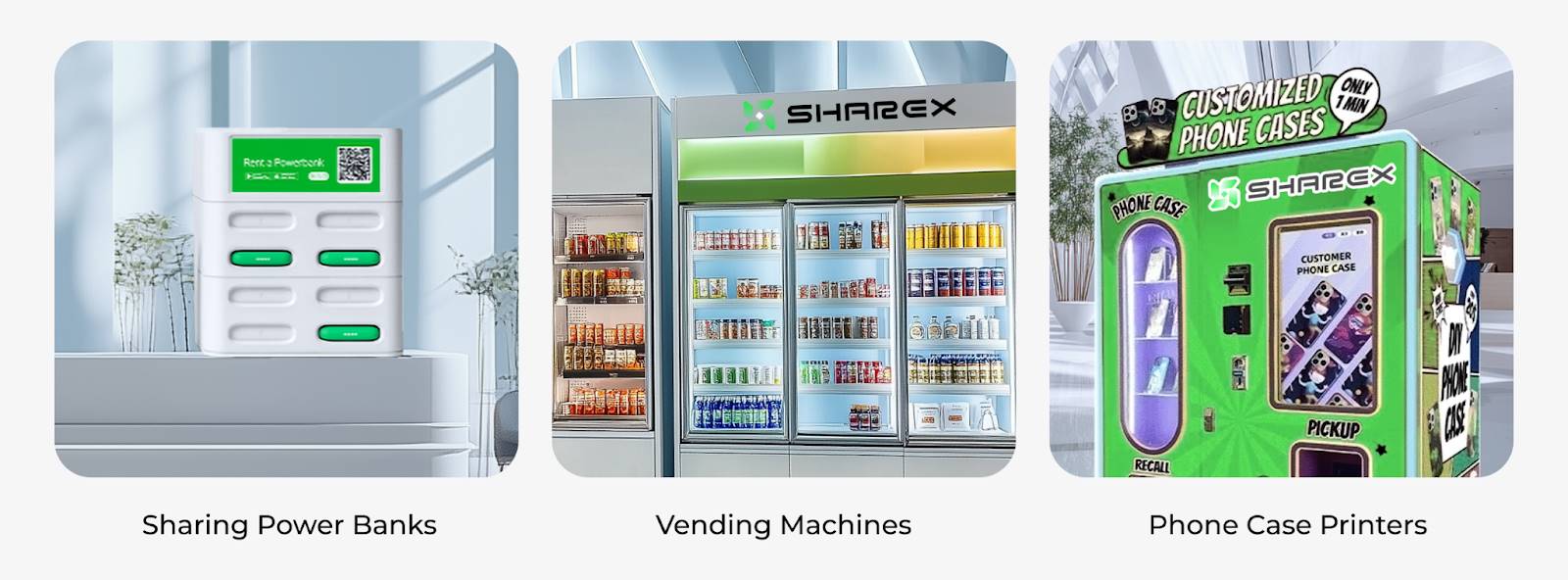Deshare 2.0 marks an advancement in the infrastructure of the sharing economy: moving from "trusted data" to "trusted devices."
Since its inception, Deshare has been redefining the connection between real-world devices and Web3: transforming decentralized IoT usage data into verifiable, settleable, and tradable on-chain value, promoting the large-scale implementation of DePIN and RWA.
Today, ShareX officially launches Deshare 2.0—bringing on-chain capabilities for hardware, a three-tier product system, and initiating the second round of global recruitment for the Deshare Alliance.
Deshare: From "Trusted Data" to "Trusted Devices"
As one of the projects in the BNB Chain MVB 10 acceleration program, ShareX has been dedicated to building a connection layer between the real world and blockchain, establishing the Web3 sharing economy infrastructure. By connecting with over 100 leading sharing economy brands globally, ShareX provides standardized offline device on-chain toolkits and integrated solutions, bringing vast amounts of real devices and usage scenarios on-chain, closing the loop from Real-World Actions → Assets → Adoption.
However, as the industry transitions from concept validation to scaling, old issues in the sharing economy have become critical bottlenecks: data opacity, unfair distribution, centralized monopolies, data falsification, and more. The operational data in business systems can no longer objectively reflect the operational status of real-world shared devices, and the "trust crisis" faced by brands poses significant challenges to their financing and development.
Deshare 2.0 provides the answer of "trusted devices": completing cryptographic signatures at the device/edge level, followed by on-chain anchoring; significantly reducing on-chain costs through batch commitments, and handling privacy and compliance with the method of "on-chain proof of storage, off-chain plaintext."
Without altering hardware or disrupting business, Deshare has already assisted multiple brands and tens of thousands of shared economy devices in completing Web3 integration. From shared power banks and vending machines to transportation and energy terminals, Deshare 2.0 enables the evolution of "data trustworthiness" in the sharing economy to "device trustworthiness," providing a solid foundation for on-chain real assets.
Three-Tier Product System: Standardized IRL Device Access Layer

1. Deshare Protocol: Trusted Core Protocol Layer
Deshare Protocol is the trust engine and core protocol layer of the entire Deshare architecture, defining and anchoring the "Minimum Verifiable Facts" of the real world.
It records, verifies, and settles real-world events in the form of a decentralized state machine, ensuring that every device action, payment, or data update has an on-chain state that can be cryptographically verified.
Core Functions:
- Identity & Ownership:
Responsible for device DID registration and brand/operator binding, establishing trusted on-chain identities and ownership relationships. - Data Proofs:
Anchoring events, usage, and payment data through Merkle Root, hashes, or CID pointers, and ensuring data is verifiable and evolvable through versioned schemas. - Settlement State Machine:
On-chaining business logic such as payment collection, revenue sharing, reconciliation, and cancellation through state transitions, achieving automated and traceable settlement processes. - Privacy & Selective Disclosure:
"Truth on-chain, bytes off-chain"—storing states and proofs on-chain while retaining plaintext and logs off-chain, balancing transparency and privacy.
Essentially, Deshare Protocol transforms "trust" itself into a programmable asset, enabling the data, identities, and economic behaviors of the real world to be verifiable, shareable, and liquid in the Web3 ecosystem.
2. Deshare Toolkit: Standardized Access Tool Layer
Deshare Toolkit is a powerful standardized access toolkit that helps existing shared devices and services quickly connect to Web3, empowering traditional operators to upgrade their blockchain infrastructure without changing their existing architecture.
It allows sharing economy brands to truly unleash their potential, achieving trusted and seamless connections between "real devices ↔ on-chain economy."
Core Capabilities Include:
- Deshare Protocol Integration:
Establishing trusted device identities and verifiable data channels without altering hardware or business logic, enabling data on-chain and solving long-standing issues of data falsification and trust deficits in the industry. - User AA & Wallet Layer:
Supporting account abstraction (AA), gas-free interactions, social logins, and mini-program wallet access, helping users enter Web3 with minimal barriers, generating verifiable, session-based user credentials to ensure real interactions and trusted participation. - Multi-Pay Network:
Unified management of fiat and crypto payment channels, supporting global on-chain and off-chain payment orchestration, achieving verifiable receipts, reconciliation hashes, and transparent settlement records. - Incentive Engine:
Dynamically linking verified devices, users, and payment data to build flexible incentive triggering mechanisms, supporting growth models like Share-to-Earn and performance-driven brand incentive systems.
Currently, ShareX has established partnerships with nearly 20 leading global sharing brands through the Deshare Toolkit, achieving large-scale integration of real devices and on-chain economies.
3. Deshare Suite: Integrated Solution Layer
Deshare Suite is a Web3 native hardware and software integrated solution suite launched by ShareX based on years of supply chain experience and global market insights, aimed at innovative brands looking to enter the sharing economy from 0 to 1.
It integrates the full-link capabilities of device networking, data on-chain, and economic settlement, transforming real-world usage behaviors into verifiable digital value. Currently, Deshare Suite supports the on-chain and commercial operation of various real devices such as shared power banks and vending machines, and will continue to expand into more sharing economy scenarios.
Through Deshare Suite, brands can quickly complete the full loop from device deployment → data trustworthiness on-chain → revenue settlement → user incentives, truly achieving "digitalization of real assets and verifiability of digital assets."

ShareX has partnered with multiple collaborators to build a new generation of Web3-driven sharing economy innovative brands using Deshare Suite, promoting the trusted on-chain integration and value release of real-world assets.
Technical Breakthrough: Achieving On-Chain Integration for Hardware
The core technological innovation of Deshare 2.0 lies in Edge-level On-chain Verification—enabling devices to complete cryptographic signatures and data anchoring locally, ensuring the authenticity and verifiability of data from the source, bridging the final gap between real-world actions and on-chain trust.
Its Edge Integration Module features verifiable identity generation, local signing, offline buffering, and automatic synchronization, combined with privacy encryption and a Merkle-based batch on-chain mechanism, achieving low-cost, scalable, and tamper-proof data trustworthiness on-chain.
To accommodate devices with varying computational capabilities, Deshare 2.0 supports four edge access modes: cloud gateway adaptation, lightweight SDK integration, secure hardware module access, and future TEE + ZK privacy verification, collectively building a unified trusted access layer covering diverse sharing economy and unmanned retail scenarios, allowing every device in the real world—from shared power banks to industrial-grade IoT terminals—to become a Web3 native node.
Through this technological breakthrough, Deshare 2.0 constructs a "hardware oracle" connecting real devices and blockchain, enabling billions of IoT devices to seamlessly integrate into the Web3 trust infrastructure, initiating a deep fusion of the real world and the on-chain world.
Global Implementation: From Brand Access to Industry Standards
From shared charging, unmanned retail to logistics equipment, Deshare 2.0 is becoming the industry standard for trusted on-chain devices in Web3.
By turning each device into a verifiable data node, Deshare achieves the verifiable unification of data flow, capital flow, and value flow, providing a trusted foundation for DePIN and RWA.
- PowerNow is a leading shared charging brand in Asia, covering countries such as Japan, Singapore, Malaysia, and Thailand. By integrating the Deshare Toolkit, PowerNow has successfully brought over 4,000 merchants and 20,000 shared charging devices on-chain, building one of the world's first trusted and verifiable shared economy DePIN networks.
- Netcharge is a shared charging brand from Kazakhstan and the first shared network in the CIS region to adopt fast charging technology. With the help of Deshare Suite, Netcharge quickly deployed thousands of Web3 native shared charging devices and supporting software systems, achieving efficient launch and trusted operation of localized Web3 business.
- YoPoint is a leading company in the global unmanned retail sector, operating in over 120 countries and deploying more than 75,000 smart vending machines in commercial and public spaces. YoPoint integrated Deshare 2.0 into its Android-based edge operating system, enabling the collection of trusted data at the hardware level, laying a solid foundation for its RWA business development.
These cases validate how real-world enterprises can quickly transform into decentralized, data-driven new economic entities through the Deshare infrastructure.
Deshare Alliance: Second Round of Global Recruitment Begins
The first phase of the Deshare Alliance has gathered over 20 leading sharing economy brands from around the world, covering 22 countries and 9 high-frequency consumption scenarios, including shared charging, shared transportation, vending machines, and distributed computing. The alliance unites over 8,600 merchants and more than 540,000 integrable devices, serving over 8.37 million users, creating a global Web3 physical entry network, laying a solid foundation for the implementation of Web3 in the real world.
Currently, ShareX has simultaneously launched the second round of recruitment for the Deshare Alliance.
Recruitment Targets
- Sharing economy brands and device manufacturers
- Web3 and DePIN project parties
- Payment institutions and infrastructure partners
- Node operators and ecosystem builders
Alliance Benefits
- Priority access to Deshare Toolkit and Deshare Suite
- Joint marketing and brand collaboration
- RWA / DePIN joint issuance programs
- ShareX ecosystem governance and project co-construction
Join Deshare 2.0: https://forms.gle/tnDKKLUy4X2ektsc9
Finally, Let Trust Become the Infrastructure
Deshare 2.0 marks an advancement in the infrastructure of the sharing economy: moving from "trusted data" to "trusted devices."
ShareX will continue to strengthen protocol integration, consumer-grade RWA solutions, and alliance governance, providing global enterprises and developers with more open and reliable underlying capabilities.
Welcome to Deshare 2.0.
免责声明:本文章仅代表作者个人观点,不代表本平台的立场和观点。本文章仅供信息分享,不构成对任何人的任何投资建议。用户与作者之间的任何争议,与本平台无关。如网页中刊载的文章或图片涉及侵权,请提供相关的权利证明和身份证明发送邮件到support@aicoin.com,本平台相关工作人员将会进行核查。




